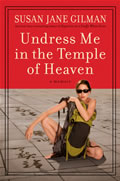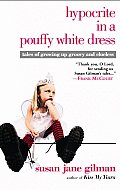
Last night, I kicked off the tour for my new book,
Undress Me in the Temple of Heaven, with a reading at a groovy independent store outside of Seattle called
Third Place Books. I'd read there on my last tour four years ago; the owners are amazing, and this time, they really rolled out the proverbial red carpet for me.
A huge poster of the book jacket stood right at the entrance, a gleaming stack of 25 books was prominently displayed on the front table, and a hot cup of tea with lemon and honey was awaiting me at the podium for my ridiculously sensitive throat. Then, as if I were an arriving dignitary, they announced my reading in symphonic tones over the PA system to the entire store — the modern-day equivalent of heralds with golden trumpets. Da-tah-da-da!
A whopping 17 people showed up.
I stood there before a sea of half-empty chairs. Of the 17 people who did show, five were my friends, one was the store owner herself, and another was my media escort for the evening. So you can do the math.
In an instant, all the grand gestures of the store owners collapsed into failed expectations.
And, of course, I felt horrible — as if it was somehow my fault.
A scene like this is actually par for the course on a book tour, even in far better economic times. Each reading is like a wedding where you don't know if the guests — let alone the groom — are going to show up.
It's incredibly nerve-wracking.
And ironically, it's an experience you only get if you are very, very lucky.
Most writers these days don't even get a book tour. We are in the worst economic climate since the Great Depression; publishing — like every other industry except perhaps liquor and pornography — is in trouble; and Seattle itself currently has an unemployment rate of nine percent — higher than the mounting national average.
I am not writing this column today to be a prima donna and moan about my pampered little authorial life: OMG. You have no idea how hard it is being on the road. Oh no! Only 10 strangers attended my book reading. And every night I'm in a different hotel. Please. Cry me a river. I know only too well that the world should have my problems. And I'm pleased that at least 10 people unrelated to me did show up at all.
 However, I'm writing today's blog for the same reason that I wrote Undress Me in the Temple of Heaven: to debunk a myth. Because even though only 10 strangers attended my reading last night, one of them still managed to tell me what I hear all the time: Oh, I would love to be a writer like you. I should be you, in fact. You're living my dream.
However, I'm writing today's blog for the same reason that I wrote Undress Me in the Temple of Heaven: to debunk a myth. Because even though only 10 strangers attended my reading last night, one of them still managed to tell me what I hear all the time: Oh, I would love to be a writer like you. I should be you, in fact. You're living my dream.
We writers hear this a lot — or variations of it. "Yeah, you're a writer? Must be nice, just typing for a living." "Oh, I am so jealous. You get to go to work in your pajamas, right?" And, one of my personal favorites: "So, are you, like, the next J. K. Rowling?"
A lot of people think that writing is not only glamorous, but easy — that if you can essentially talk, you can essentially write. Any idiot, in their opinion, can publish a book. Given some of the dreck that gets published, I sometimes worry that they're right.
The great irony of writing, like that of any art or sport, is that if you do it well enough, you make it look effortless. And then everyone around you thinks that it is effortless, and that they can easily do what you do, too, and so they talk to you condescendingly.
"You're a writer? No kidding?" they say. "You know, I was thinking of taking a few months off and writing a book myself."
Yeah? I always want to respond. Funny, I was thinking of just taking a few months off and practicing brain surgery...
There's a mystique that surrounds writing. Many people seem to think that we authors just sit down at our desk, get hit with a lightning bolt of inspiration, and have words of perfection just pour out of us. The process, to them, is a combination of innate talent and speaking in tongues.
Once in a very great while, this actually does happen to me. I sit down to write, and the words just flow, as if I'm channeling them. But 98% of the time, they don't. And what's more, when the words do flow effortlessly, chances are that I'm producing some really world-class drivel.
Yeah, talent is important. But it's like anything else. If you don't practice and hone it, fuggedaboutit. Even Michael Jordan did something like 300 lay-ups a day. The secret to great writing, in the end, boils down to four words: Ass in the chair. If you're not sitting down and just doing it, eloquence is moot.
 The reality of being a "glamorous" author is this: for years on end, we are not on book tours. For years on end, we are not being published. For years on end, we are sitting alone in a room somewhere, staring catatonically at a blank notebook or a blinking cursor. We write and delete, write and rewrite, and the bulk of our efforts will never see print. We have no colleagues except for the relentless little voices in our head that tell us one day that we are unsung literary geniuses, and the next day that we are total shit — and who are we kidding? What we're writing is really, really terrible. We should just go and become a hairdresser instead.
The reality of being a "glamorous" author is this: for years on end, we are not on book tours. For years on end, we are not being published. For years on end, we are sitting alone in a room somewhere, staring catatonically at a blank notebook or a blinking cursor. We write and delete, write and rewrite, and the bulk of our efforts will never see print. We have no colleagues except for the relentless little voices in our head that tell us one day that we are unsung literary geniuses, and the next day that we are total shit — and who are we kidding? What we're writing is really, really terrible. We should just go and become a hairdresser instead.
Mark Twain once observed that "A classic is something that everyone wants to have read, but that nobody wants to read." The same may be said of writing: "A book is something that everyone wants to have written, but that nobody wants to write."
Let me be clear: There are far worse jobs to have. Coal miner, toll booth clerk, firefighter, nurse, assembly-line worker, toxic waste specialist, and brain surgeon all come to mind. Writing is neither high-stakes nor mind-numbing nor physically dangerous, though we do seem to have a predisposition for alcoholism and suicide. (Though, hey: who doesn't?)
And I'm happy just to be employed, period.
But make no mistake about it: writing is a lonely, arduous, insecure, and often thankless profession. I've written two bestselling books so far, with a third just being launched, and not only am I not rich, I never get to see the full fruits of my labor.
Yeah, I get to hold my published books in my hands, which is a thrill, but I don't ever get to see people actually reading them. I can't follow folks home after they've bought a copy and hover over them, watching them turn the pages, witnessing their pleasure or revulsion. I will spend anywhere from two to four years writing a book. And then, once it's finally published, I can hope — and only hope — that people are reading it somewhere. I can only hope that they will attend my readings and enjoy them.
So please, come to Powell's tomorrow evening. Whether you're one of forty in the audience or five, your presence will be like fireworks. Meeting readers — that's the real joy and reward of my profession. That's the real dream.